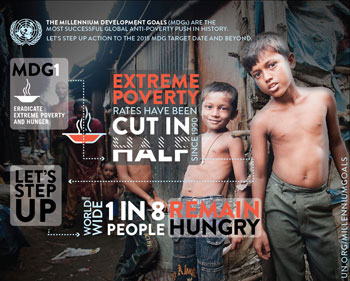| The following article was produced by the International Labor Organization (ILO) |
 |
“People living in poverty are particularly subject to discrimination and the exclusion that characterizes it because of their poverty (…) We cannot be indifferent – change requires collective responsibility towards the poorest and most vulnerable,” says ILO Director-General Guy Ryder in a statement issued on International Day for the Eradication of Poverty.
 |
October 17, 2013 – Geneva:
It is timely to focus on the discrimination faced by many women and men living in situations of extreme poverty – the theme of this Day.
Working poverty has continued to decrease, but at a slower pace than before the crisis. There are still some 870 million workers living with their families on less than US$2 per person per day, of which nearly 400 million are living in extreme poverty. A further 660 million workers are living just above the poverty line and are at high risk of falling back.
Commonly, people living in poverty are particularly subject to discrimination and the exclusion that characterizes it because of their poverty. The injustice is magnified when multiple bases of discrimination, including gender, come into play.
People living in poverty show tremendous ingenuity in coping with their immediate situation; they know the changes and institutions that will best serve their own efforts to advance. Yet, more often than not, they are ignored when policies are devised. Effective policies for poverty reduction call for an engagement with those whom they are intended to benefit.
Sustainable development means tackling poverty and inequality agendas and recognizing their interconnections. Jobs are the fundamental link between people, their communities, their society and the economy, and the quality of work is instrumental in the trajectory of that relationship. In this framework, the expansion of opportunities to work in conditions of freedom, security, equity and dignity is a critical goal and all the more urgent for people living in extreme poverty. Poverty reduction targets must be set within a development process that recognizes and gives effect to the central role of work in people’s lives and the role of decent work as the sustainable route out of poverty. How can this be done?
We cannot be indifferent – change requires collective responsibility towards the poorest and most vulnerable. Let us draw on and amplify those experiences which show that a rights-based and inclusive approach to sustainable development centred on jobs is feasible. Indeed this is imperative if the goal of ensuring a life with dignity for all is to become a reality.